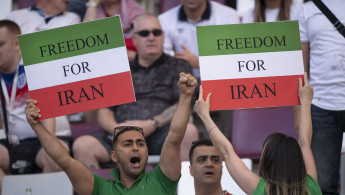Iran forces harass detained and killed protestors' family members
The family members of protestors detained or killed during the nationwide demonstrations in Iran have reported harassment, intimidation and attacks by the intelligence officers and the Islamic Revolutionary Guard Corps (IRGC) forces.
The New Arab spoke with sources in Iran, who confirmed that the authorities had threatened them not to talk about the arrest of their family members or not to hold any funeral ceremony for the protestors shot by the police and IRGC.
A source close to the relatives of a Baluch man, shot by live ammunition in Zahedan's Bloody Friday, told TNA the slain protestor's family was forced to bury him with no burial ceremony.
"They didn't give the dead body to his family for a week," the source explained. "First, they denied that his body was kept at the hospital's morgue or even that he was killed in the shooting after Friday prayer," he added, referring to demonstrations in the southeastern city of Zahedan on 30 September.
People in Zahedan took to the streets that day to protest the rape of a 15-year-old girl from the Baluch minority ethnic group by a police colonel. At least 82 protestors were killed in the incident that became known as Zahedan's Bloody Friday. However, the authorities did not immediately release the dead people's bodies.
According to the TNA source in Zahedan, the family of the protestor killed in Bloody Friday received his dead body only after they signed a written guarantee, promising not to invite people to the funeral or talk about the cause of death, especially with the media.
"To make sure that the family keeps the promises, the IRGC plain-cloth agents came to the cemetery. The family wanted to make a video of the burial by a mobile phone, but the person recording the video with his phone was arrested," this source added.
Seizing the killed bodies of protestors has become routine for the authorities as they attempt to contain the nationwide demonstrations aimed at the collapse of the country's theocracy.
On 16 September, the anti-establishment demonstrations began in Tehran after the death of 22-year-old Mahsa Amini in Iran's "Islamic morality police" custody. The deadly protests rapidly spread across the country, in which the security forces killed at least 378 people.
One of the latest deadly episodes of the armed forces' attacks on demonstrators occurred in the Western city of Izeh on 16 November, which left at least seven deaths, among them the nine-year-old Kian Pirfalak.
A video of his dead body went viral on Faris social media, showing pieces of ice around his corpse. The Pirfalak family used ice to keep their son's body out of the morgue before the burial, fearing the confiscation of the body by the intelligence agents.
At the same time, as officials threatened and harassed the family members of those killed by the security forces, the relatives of the arrested protestors and activists have also faced unprecedented pressure.
The parents of the detained youths have been deprived of their rights to have information about their children's whereabouts for several days after the arrest.
Since the beginning of the demonstrations, a large crowd has gathered every morning in front of Tehran's infamous Evin prison, hoping to have news about their children. Many of these families experience psychological torments.
The father of a prominent political activist Hossein Ronaghi had a heart attack in front of Evin after days of waiting outside the prison, in the street.
Videos of Elham Afkari's parents trying to learn about their daughter's situation under arrest shocked Iranians last week. The Afkaris, whose son was executed in 2020, was seen in the video knocking at the gate of the intelligence ministry provincial office in the city of Shiraz.
While the situation of known activists attracts national and international attention, ordinary people arrested by the IRGC and police face a more dangerous condition as they are at risk of receiving a death sentence.
"All I'm afraid of is that they give a death penalty to my son," told TNA, the father of an 18-year-old boy who was arrested in Tehran in October.
This protestor was arrested in central Tehran and immediately transferred to Evin, however, during the first two weeks, the prison and judiciary authorities did not give any information to the parents about his arrest.
"My son's friends told us that he was caught. So we started searching for him at the police stations, but we were told protestors were kept in Evin," the father added.
"For two weeks, every morning, we went to the prison, asking about him, and the only answer we heard was that he was not there. Then, after two weeks, he called from the jail and told us he was in Evin, and his interrogations had finished."
When the judiciary officials from a branch of the Islamic Revolutionary Court inside the prison contacted the protestor’s parents, they were ordered not to talk about their son's case or to go to the prison's gate and gather with other detainees' relatives.
"Yet we have not met our son, but they told us not to employ a lawyer for him or talk to anyone about his arrest because this would worsen his situation," the father added. "We don't know what to do. We are waiting in limbo."





 Follow the Middle East's top stories in English at The New Arab on Google News
Follow the Middle East's top stories in English at The New Arab on Google News


